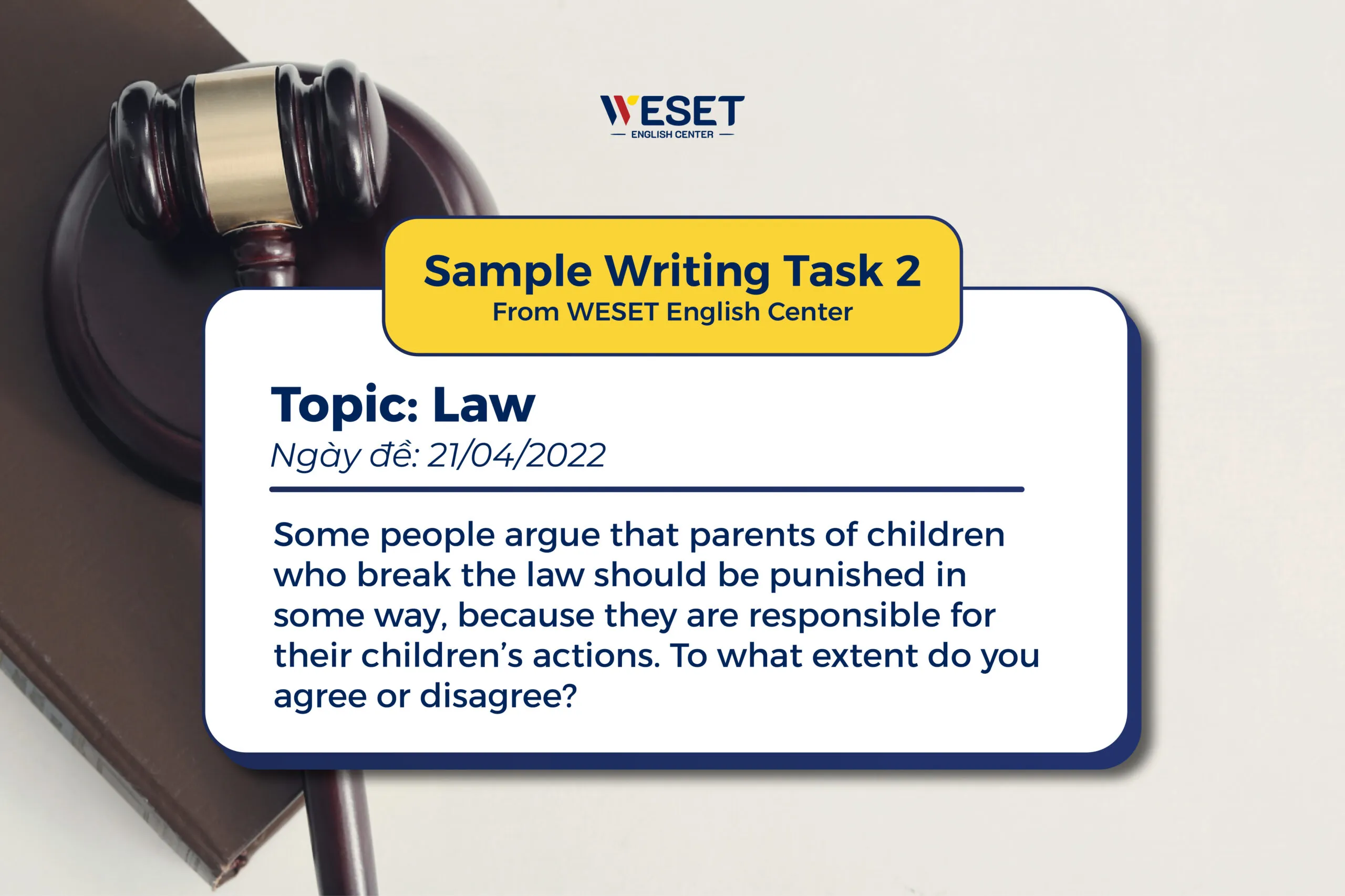Giải đề mẫu Writing Task 2 | Chủ đề: Family
- WESET
- Bài mẫu Task 2 IELTS Writing sample, Bài thi IELTS mẫu, Blog, Blog IELTS
MỤC LỤC
Có quan điểm cho rằng: Ba mẹ cần phải chịu trách nhiệm khi con cái vi phạm pháp luật. Bạn nghĩ sao về quan điểm này. Cùng xem gợi ý giải bài của WESET bên dưới nhé!
Đề bài: Some people argue that parents of children who break the law should be punished in some way, because they are responsible for their children’s actions. To what extent do you agree or disagree?

IELTS Writing Task 2: Nêu quan điểm về việc có nên xử phạt đối với những ba mẹ có con cái vi phạm pháp luật không
1. Outline
Introduction:
- Paraphrase đề
- Thể hiện quan điểm bản thân:
- Đồng ý 1 phần với đề bài, cha mẹ nên chịu trách nhiệm trong việc giáo dục hành vi của con
- Trẻ thành niên phạm tội cần phải chịu trách nhiệm cho hành vi của mình để làm hình phạt cho tương lai
Body paragraph 1: Cha mẹ nên có trách nhiệm trong hành vi của con:
- Cha mẹ cần phải giáo dục con trẻ từ nhỏ để có tư tưởng thượng tôn pháp luật. Giáo dục gia đình là quan trọng nhất, nếu con được giáo dục kỹ từ nhỏ sẽ tạo ra thói quen và không bao giờ vi phạm. Ngược lại, nếu trẻ không nhận được sự giáo dục cẩn thận từ gia đình, không được cha mẹ quan tâm từ nhỏ thì sẽ có khả năng phạm tội trong tương lai cao hơn rất nhiều.
- Hơn nữa, nếu người phạm tội dưới mức tuổi nhất định, cha mẹ cần phải chịu trách nhiệm theo đúng pháp luật, giáo dục lại con cái. Trên thực tế, có các điều luật của các bộ luật quy định rõ độ tuổi cần có cha mẹ kiểm soát
Body paragraph 2: Ai phạm tội thì người đó chịu trách nhiệm:
- Người trẻ nên chịu trách nhiệm cho hành vi của chính mình do cha mẹ không hoàn toàn kiểm soát được hành vi của con cái khi chúng lớn lên, và có nhiều yếu tố ảnh hưởng đến trẻ trong độ tuổi trưởng thành
- Người trẻ khi đã có đủ kinh nghiệm và kiến thức để biết phạm tội là sai thì cần chịu trách nhiệm cho hành động của mình, từ đó là một hình mẫu cho các thế hệ tiếp theo
Conclusion: Khẳng định lại quan điểm
2.Essay
In recent years, the rate of premature crimes is increasing in both number and seriousness. Whether or not parents should be responsible for their children’s violation is a matter of debate and varies by jurisdiction. In some countries, parents can be held legally responsible for their children’s actions, while in others, they cannot. In my opinion, I reckon that parents should have some responsibility for their children’s behaviors, while in other cases there are factors to be taken into account.
On the one hand, the rationale for holding parents responsible for their children’s actions is that parents have a duty to raise and guide their children to become responsible members of society. Obviously, family education has long held a vital role in sharpening the potential behaviors of youngsters. To elaborate, parents have a tremendous influence on children’s thinking and behavior from the very first years of their life, as children tend to replicate their parents’ speech and actions. Henceforth, when children violate the law, it is seen as a failure of the parent’s responsibility to provide adequate supervision and guidance. Moreover, in many countries there appears to be a section of laws for those violators under the age of maturity, which involves specialized education from family and authorities. In short, parents should be involved in a way or another in the process of reshaping and nurturing personalities of premature crimes.
On the other hand, it is apparent to note that parents may not always be fully responsible for their children’s actions. Children have agency and free will, and their actions are not always predictable or controllable by their parents. Additionally, as children grow up, there may be other factors such as peer pressure or mental health issues which contribute to a child’s behavior. In many cases, rather than punishing parents for their children’s actions, it may be more effective to provide support and resources to help children adjust and modify their way of thinking. This could include re-educating classes, counseling, or access to community resources that can help young generations address any underlying issues that may be contributing to their behavior. As a result, these solutions can be a model for future generations to follow. Briefly, there are many ways to help younger generations raise awareness of their actions.
In conclusion, while parents play an imperative role in shaping their children’s behavior, it may not always be appropriate or effective to hold them solely responsible for their children’s actions. Each case should be evaluated on an individual basis, taking into account the specific circumstances and factors involved.
3. Highlighted Vocabulary
- To be a matter of debate: Là một vấn đề gây tranh cãi
- Jurisdiction (n) = The authority that an official organization has to make legal decisions about somebody/something: Hội đồng xét xử
- Rationale (n) = Reason
- Tremendous (adj): Rất lớn, trong bài là rất có sức ảnh hưởng
- Premature (adj): Chưa trưởng thành
- Nurture (v) = To care for and protect somebody/something while they are growing and developing: Nuôi dưỡng
- Peer pressure (n): Áp lực cùng trang lứa
- Counsel (v) = To listen and give support to those in need: Tư vấn, tham vấn
- Play an imperative role (v): Đóng vai trò tối quan trọng
Có thể bạn quan tâm
Giải đề mẫu Writing Task 2 – Ngày đề 27/12/2022 | Chủ đề: Learning
Giải đề mẫu Writing Task 2 – Ngày 29/12/2022 | Chủ đề: Mobile phones
Giải đề mẫu Writing Task 2 – Ngày 09/04/22 | Chủ đề: Learning languages






